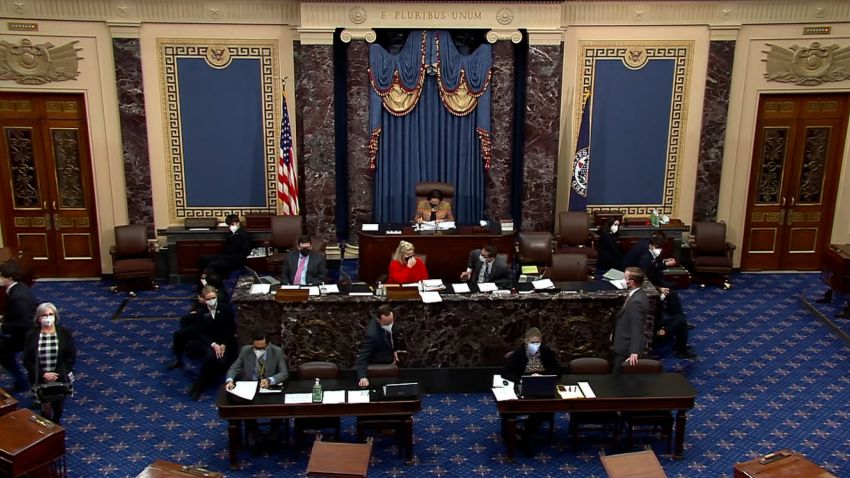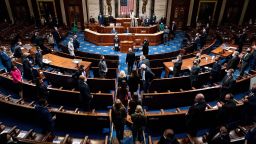Editor’s Note: Chris Murphy, a Democrat, is the junior US Senator from Connecticut. The views expressed in this commentary are his own. View more opinion on CNN.
This month, I was proud to join a bipartisan group of 16 US senators to introduce legislation to reform the antiquated Electoral Count Act. The 1887 statute created the arcane process that governs how states transmit their results for the presidential election to Congress – and then how Congress counts these votes and declares a winner.

The vagueness of the current law and ambiguity around the role of the vice president created an opening for former President Donald Trump to undermine and attempt to overturn the legitimate presidential election results. He summoned a violent mob to the Capitol on January 6, encouraging them to “stop the steal,” a phrase alluding to false allegations of wide scale voter fraud. The mob complied and stormed the building, threatening to “hang Mike Pence” unless he, aided by a small group of senators and an alarmingly large group of House members, overturned the results of the unequivocally free and fair election.
Thankfully, that effort failed, but people died that day – and the image of America was forever sullied around the world. Trump and his band of loyalists are responsible for what happened on January 6, but there is no doubt that the Electoral Count Act, as currently written, provides far too many avenues for abuse from those who want to replace American democracy with American monarchy.
While reform of the electoral count process is not sufficient to protect us against a repeat of 2021 in 2025, it is a key component of a much larger group of reforms necessary to protect our democracy in the face of efforts by Trump and his supporters to learn from their mistakes in 2020 and try to install him in office in 2025 – no matter the result of the vote.
My goal, as a member of the bipartisan group formed by Sens. Joe Manchin of West Virginia and Susan Collins of Maine, was to make sure that any reforms to the Electoral Count Act weren’t just window dressing, but addressed the threats to democracy from both state and federal actors. To that end, our group consulted with a broad range of experts: election law litigators, the American Law Institute, law professors, the Senate parliamentarian, civil rights groups and think tanks across the ideological spectrum.
We worked through countless drafts and re-drafts to ensure that the bill puts in place new guardrails to constrain the vice president, Congress and the judiciary from acting to subvert the legitimate outcome of an election, while greatly reducing the possibility for state legislatures and executives to cause mischief in the certification and transmission of state’s votes.
The draft bill we released puts serious new impediments in the path of a candidate who tries to subvert the will of the voters through the appointment of fraudulent electors. For instance, our bill requires states to certify and transmit the results of their election to Congress according to the laws in place before the election occurred – and prohibits a state from changing the rules of how electors are chosen after the election.
Our bill raises the threshold – from just one member to one-fifth of the House and Senate – for objections to elector slates, in order to prevent a handful of bad-faith actors from using the objection process to force Congress to debate and vote on spurious objections.
The bill eliminates any uncertainty about the vice president’s authority to unilaterally throw out votes – there is none – and makes reforms to reduce the concern that votes will be thrown out in a bad-faith attempt to let the House choose the next president.
Finally, the bill sets up a new, expedited path in the federal courts to settle any contests over electors, before the controversy gets to the Congress. Importantly, this bill doesn’t change the role of state courts in hearing election-related challenges, nor does it require the Supreme Court to hear every spurious case about the certification process.
Still, the bill is not perfect. I believe commentators have raised legitimate concerns about the time allotted for federal judicial review and made good suggestions for other small technical fixes. As the bill is considered by the Rules Committee, I have faith that Sens. Amy Klobuchar of Minnesota and Roy Blunt of Missouri will be able to iron out these lingering concerns so we can vote on the legislation before the end of the year.
While I am confident that the bill we introduced will address many of problems we saw during the 2020 election, I am the first to admit it will not address a critical shortcoming in our federal voting laws, namely a lack of statutory prohibitions against the measures some states are taking to restrict citizens’ right to vote. We should pass this bill, but we should know that it is just the first step in restoring faith in our democracy.

